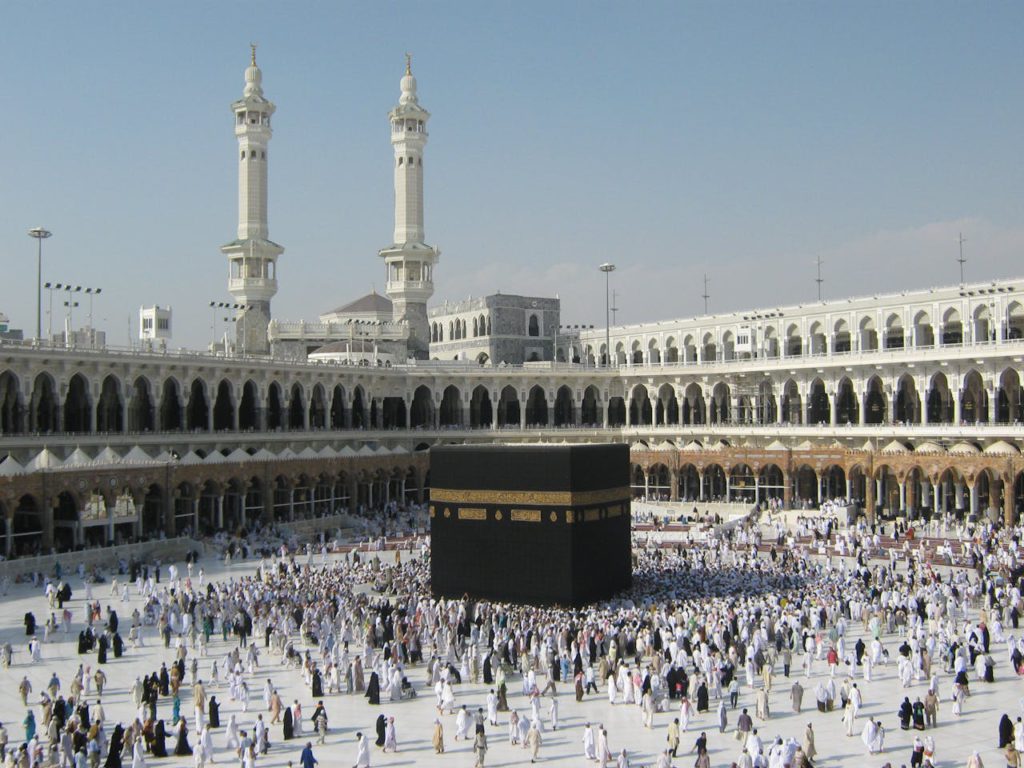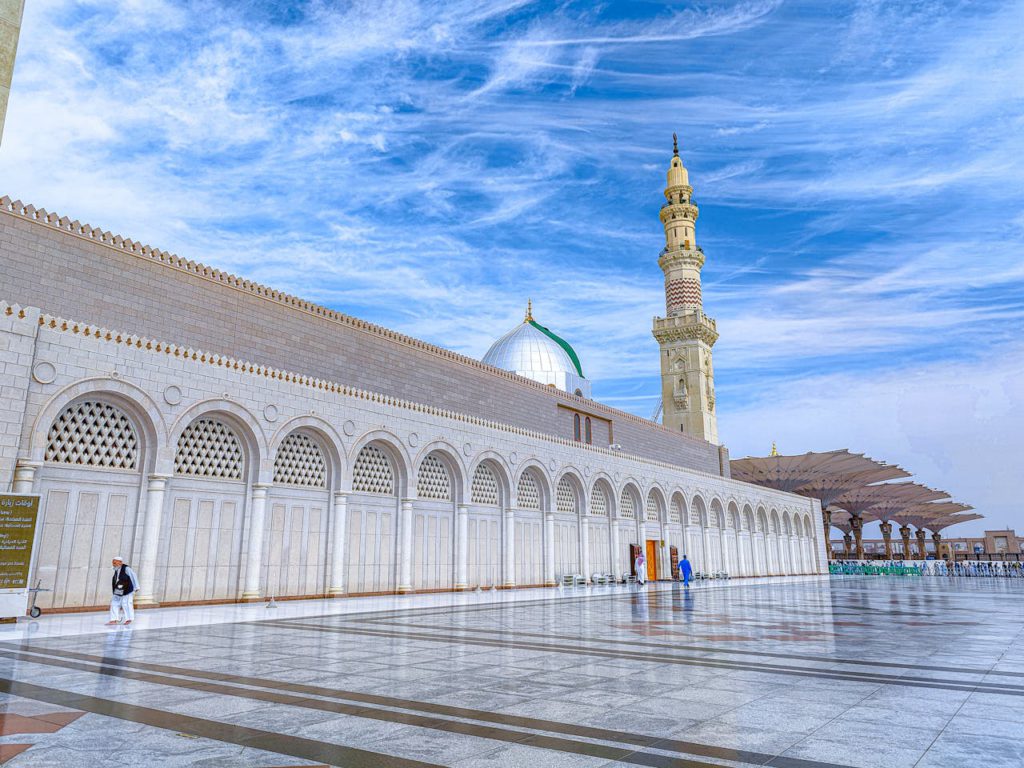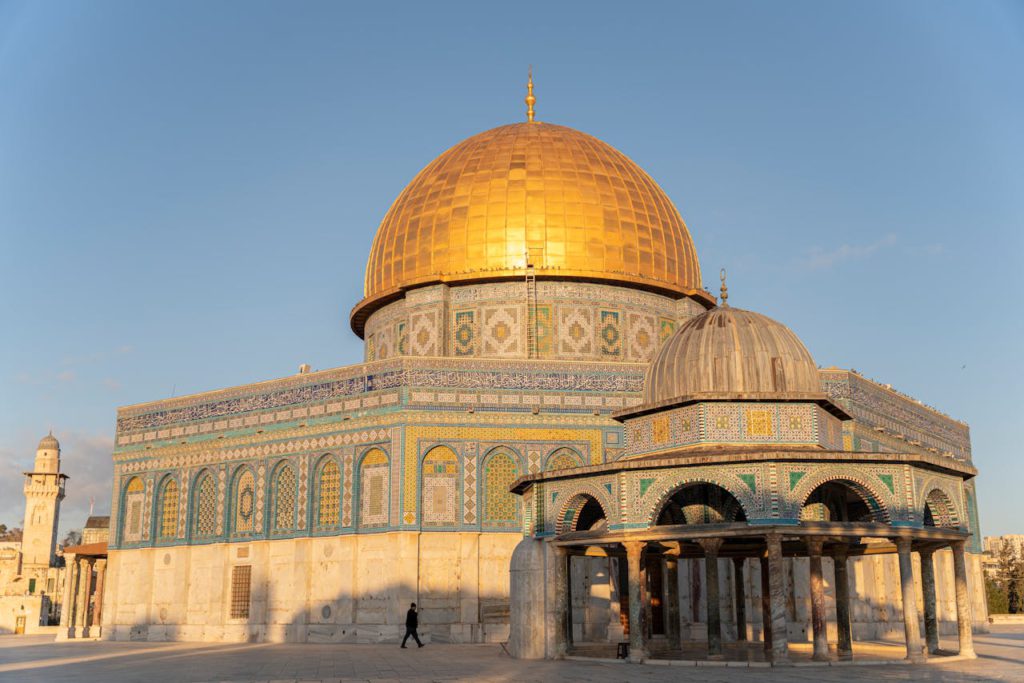Travel is an important part of human life, whether for work, leisure, or seeking knowledge. In Islam, however, the Prophet ﷺ emphasized that when it comes to making a journey for the purpose of worship, there are only three mosques that hold a unique status.
Abu Sa‘id al-Khudri (RA) narrated that the Messenger of Allah ﷺ said:
“No (religious) journey is to be undertaken except to (pray in) the three mosques: The Sacred Mosque (Makkah), the Aqsa Mosque (Jerusalem), and this Mosque of mine (al-Madinah).”
Agreed upon, al-Bukhari’s wording.
This hadith reminds us of the virtue and sanctity of these mosques and the unique rewards associated with praying in them.
The Three Sacred Mosques
1. Al-Masjid al-Haram (The Sacred Mosque in Makkah)

- Located in the holy city of Makkah, it is the most sacred site in Islam.
- It houses the Ka‘bah, the Qiblah (direction of prayer) for all Muslims.
- Praying in this mosque carries a reward equal to 100,000 prayers elsewhere (except the other two sacred mosques).
It was narrated from Jabir that the Messenger of Allah (ﷺ) said:
“One prayer in my mosque is better than one thousand prayers elsewhere, except the Sacred Mosque, and one prayer in the Sacred Mosque is better than one hundred thousand prayers elsewhere.”
Grade: Sahih (Darussalam)
Reference: Sunan Ibn Majah 1406
Abu Dharr said that he asked God’s Messenger which mosque was set up first in the earth and was told that it was the sacred mosque. He asked which came next and was told that it was the Aqsa mosque. He asked how long a space of time separated their building and the Prophet told him it was forty years, adding,
“Then the earth is a mosque for you, so pray wherever you are at the time of prayer.”
Bukhari and Muslim.
- Performing Hajj and ‘Umrah are acts of worship directly tied to this blessed Masjid.
2. Al-Masjid an-Nabawi (The Prophet’s Mosque in Madinah)

- Built by the Prophet ﷺ himself after the Hijrah.
- It contains the Prophet’s resting place ﷺ, alongside Abu Bakr (RA) and ‘Umar (RA).
It was narrated from Ibn ‘Umar that the Prophet (ﷺ) said:
“One prayer in this mosque of mine is better than one thousand prayers in any other mosque except the Sacred Mosque.”
Grade: Sahih (Darussalam)
Reference: Sunan Ibn Majah 1405
- Visiting this mosque is not part of Hajj or ‘Umrah obligations, but it is a great sunnah with immense reward.
3. Al-Masjid al-Aqsa (The Farthest Mosque in Jerusalem)

- The first Qiblah of Muslims before the Ka‘bah.
The fools among the people (pagans, hypocrites, and Jews) will say, "What has turned them (Muslims) from their Qiblah [prayer direction (towards Jerusalem)] to which they used to face in prayer." Say, (O Muhammad صلى الله عليه وسلم) "To Allâh belong both, east and the west. He guides whom He wills to the Straight Way."
Surat Al-Baqarah Ayah 142
Abu Ishaq reported:
I heard al-Bara' saying:
We prayed with the Messenger of Allah (ﷺ) (with our faces) towards Bait-ul-Maqdis for sixteen months or seventeen months. Then we were made to change (our direction) towards the Ka'ba.
Reference: Sahih Muslim 525b
- It was the site of the Isra and Mi‘raj, the miraculous night journey of the Prophet ﷺ.
Narrated Jabir bin `Abdullah:
The Prophet (ﷺ) said,
"When the Quraish disbelieved me (concerning my night journey), I stood up in Al- Hijr (the unroofed portion of the Ka`ba) and Allah displayed Bait-ul-Maqdis before me, and I started to inform them (Quraish) about its signs while looking at it."
Reference: Sahih al-Bukhari 4710
- Praying in this mosque carries the reward of 500 prayers elsewhere (other than the two greater mosques).
“Al-Bazzar and al-Tabarani narrated from Abu al-Darda (RA), in marfu‘ form (attributed to the Prophet ﷺ):
‘The prayer in al-Masjid al-Haram is equivalent to one hundred thousand prayers. The prayer in my mosque is equivalent to one thousand prayers. And the prayer in Bayt al-Maqdis is equivalent to five hundred prayers.’
Al-Bazzar said: Its chain is Hasan (good). This was transmitted by al-Hafiz Ibn Hajar.”
- It remains a symbol of spiritual connection for Muslims worldwide.
Why the Prophet ﷺ Specified Only Three Mosques for Religious Journeys
Al-Hafiz Ibn Hajar said in his commentary on this hadith (Fath al-Bari, 3/65):
“This hadith highlights the virtue of these mosques and their superiority over others, because they are the mosques of the Prophets. The first (Masjid al Haram) is the Qiblah of the people and the destination of their Hajj; the second (Masjid al Aqsa) was the Qiblah of previous nations; and the third (Masjid an Nabawi) was founded upon piety.”
Can You Travel for Jumu’ah at a Mosque Named After a Sheikh? — Sheikh Ibn Baz’s Fatwa
Question:
Is it permissible for a person to travel from one country to another to pray Jumu’ah in a mosque called, for example, “Sheikh So-and-so’s Mosque”?
Answer (Sheikh Ibn Baz):
If the travel is simply because it is called “Sheikh So-and-so’s Mosque,” then no — one should not undertake a journey just for a particular mosque or because it is associated with a certain Sheikh. The important factor is the presence of a good imam; if the imam is righteous, praying behind him is good due to his piety, proper recitation, and humility in prayer. This is praiseworthy if a person intends to pray behind him for the sake of his proper recitation and devotion.
However, traveling specifically for the virtue of a mosque merely because it is associated with a certain person is not permissible. The Prophet ﷺ said:
“Do not undertake a journey except to three mosques: the Sacred Mosque (Masjid al Haram), my mosque (Masjid an Nabawi), and the Aqsa Mosque (Masjid al Aqsa).”
Other mosques do not have this ruling, even if their founders or associated sheikhs are well-known for goodness.
However, if the journey is for seeking knowledge, or to pray behind a scholar or righteous person for the sake of learning and benefiting from him—not for the mosque itself—then that is permissible. Traveling for education or to pray behind a good imam is allowed.
Scholars’ Note on Prayers and Sins in the Sacred Mosque
It is established that prayer in Masjid al Haram is multiplied by one hundred thousand. Some scholars say this applies to both obligatory (fard) and voluntary (nafl) prayers, while others specify it for the obligatory prayers and other acts of worship performed there, meaning the reward for these deeds is greatly increased in the Haram. However, we have not found evidence proving that sins are multiplied by one hundred thousand in the Haram. Likewise, there is no evidence that sins are multiplied by that number.
-IslamWeb Fatwa
Conclusion
The hadith of the Prophet ﷺ emphasizing travel only to the three sacred mosques—Masjid al Haram, Masjid an Nabawi, and Masjid al Aqsa—reminds us of their unique status and unmatched spiritual value. Scholars, including Ibn Hajar, explain that their virtue stems from being the mosques of the Prophets, their historical role as Qiblahs, and their foundation upon piety.
The rewards of prayer in these mosques are immense, and every prayer offered in them carries great spiritual merit. At the same time, Islamic scholars like Sheikh Ibn Baz clarify that traveling to other mosques solely for their association with a person or place is not permissible; the emphasis is on sincerity, piety, and seeking knowledge rather than location alone.
In essence, these mosques are not only sites of worship but also beacons of spiritual connection, history, and unity for the Muslim Ummah. Visiting them with the correct intention strengthens one’s faith, increases reward, and deepens our appreciation for the legacy of the Prophets ﷺ.